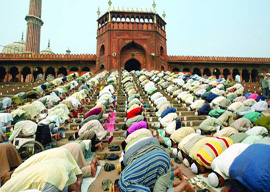
December 20, 2011

India, with 150 million Muslims, has more than both Egypt and Iraq. Russia, with 25 million, has more Muslims than Libya and Jordan combined. China has more than Syria. Five percent of Europe is Muslim, and the numbers continue to rise.
And as with Christianity when it was surging in the 16th and 17th centuries, Islam is marked today by militancy and intolerance. From Nigeria to Ethiopia, Egypt, Iraq, Afghanistan and Pakistan, Christians are being made the victims of Muslim pogroms. And as with Christianity in the 16th and 17th centuries, Islam is a house divided, between Shia and Sunni.
If demography is destiny, the future would seem to belong to Islam.
Consider. The six most populous Muslim nations—Bangladesh, Egypt, Indonesia, Pakistan, Nigeria and Turkey—had a total population of 242 million in 1950. By 2050, that 242 million will have quintupled to 1.36 billion people.
Meanwhile, Europe’s fertility rate has been below zero population growth since the 1970s. Old Europe is dying, and its indigenous peoples are being replaced by Third World immigrants, millions of them Muslim.
Yet there is another side to the Islamic story.
In international test scores of high school students in reading, math and science, not one Muslim nation places in the top 30. Take away oil and gas, and from Algeria to Iran these nations would have little to offer the world. Iran would have to fall back on exports of carpets, caviar and pistachio nuts.
Not one Muslim nation is a member of the G-8 economic powers or the BRIC-four emerging powers—Brazil, Russia, India, China.
In the 20th century, the world saw the rise of the Asian “tigers”—South Korea, Taiwan, Singapore, Hong Kong. Where are the Muslim tigers?
A few years back, the gross domestic product of the entire Arab world was only equal to Spain’s. Take away oil and gas, and its exports were equal to Finland’s.
Measured by manufacturing power, the Islamic world, though more populous, cannot hold a candle to China. And while Islam was a civilization superior in some ways to the West from the 7th to 17th century, somewhere that world began to stagnate and decline.
So the question arises: If Islamism is capturing Libya, Tunisia and Egypt, and will capture other Muslim nations as the Arab Spring advances, where is the historic evidence that these Islamic regimes can convert their states into manufacturing and military powers?
Where is the evidence that Islamist regimes such as Sudan and Iran can deliver what their peoples demanded when they brought down the dictators?
And if, like the communist regimes of the 20th century, they cannot deliver the good life that the rebels sought when they dumped the tyrants, what will follow Islamism, when Islamism inevitably fails?
In the long run, does Islamism really own the future of the Islamic world? Or has the clock begun to run on the fundamentalists as well?